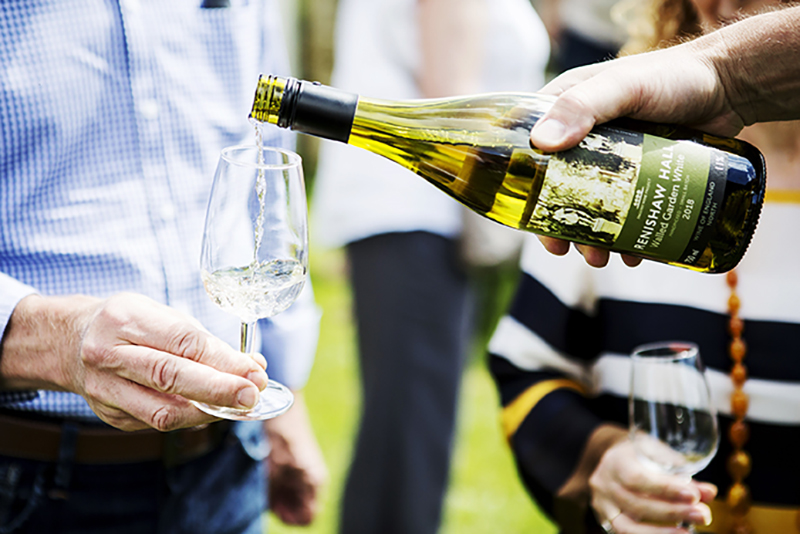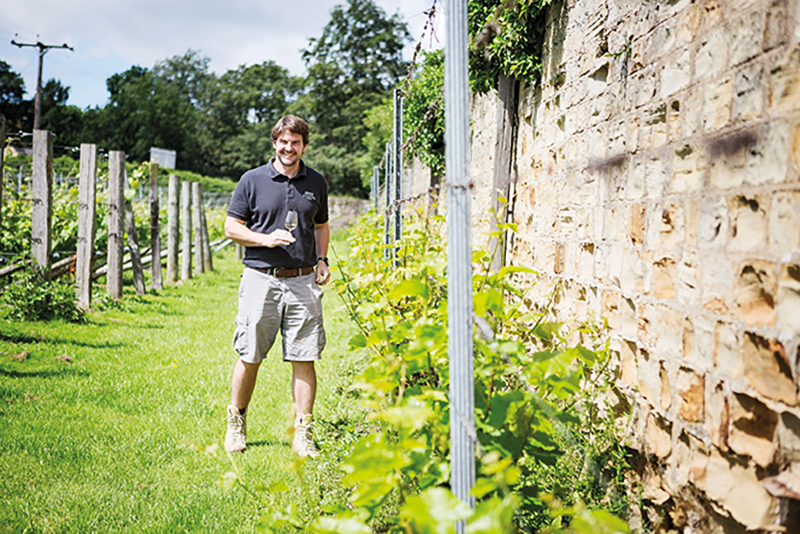Kieron Atkinson at Renishaw Hall, Derbyshire, talks to Vineyard magazine about managing the northern walled vineyard.
How did you end up working in UK viticulture?
In my previous career, I was an Army officer in the Light Dragoons. It was an amazing and incredible experience, including tours of Iraq and Afghanistan. While deployed, it made me realise just how lucky we are that we have complete freedom of choice to do anything we want with our lives, unlike in some parts of the world where surviving another day is a challenge. When I left the Army, I decided to turn to wine. I went to Plumpton, took on a vineyard, Renishaw Hall, worked for the Rothschilds, became a consultant winemaker at Halfpenny Green Vineyards and now I have a business called the English Wine Project.
How has English wine changed since you started working in the industry?
English wine, not much, it was a great product a decade ago. However, the industry has changed for the better in a big way; there are more professionals, more vineyards, more money and more opportunity, it is a great time to be involved in it.
How do you approach soil health?
I analyse the soil every year to see where it is and what it needs, if it needs support I will provide it. There sometimes seems to be a badge of honour in doing nothing with the vines, which to me makes no sense whatsoever if they are suffering.
How has the vineyard changed over the years?
Renishaw Hall’s vineyard was originally planted with Pinot noir, Reichensteiner and Trebbiano. When I arrived in 2010 there was Seyval blanc, Madeleine angevine, Phoenix and what I suspect to be some of the remaining Reichensteiner planted. I have since added Rondo and can happily say that it really likes the conditions. If anything, the Madeleine can over ripen if not carefully managed, which is a major change in the past 10 years of being there. I use a double guyot training system, generally leaving seven nodes per fruiting arm. I have experimented with a number of different systems and have applied quite a lot of theory over the years to the practices at Renishaw, but the best the vineyard is double guyot.
Who planted Renishaw Hall’s vineyard?
It was planted by the late Sir Reresby Sitwell in 1972, then owner of Renishaw Hall. It’s located in a walled area a few hundred metres away from the main hall, which remains the Sitwells’ family home. For about 15 years it was the most northerly vineyard in the world, never mind the UK. Despite there now being several vineyards further north than Renishaw, the tag of ‘most northerly’ has remained making us one of the go-to vineyards when discussing climate change and the ability to grow grapes ‘up north’. The vineyard has been in existence for such a long time now and we can discuss with some authority how it has changed over the years.
What makes the Renishaw vineyard special?
It is a 300-year-old stone walled structure housing some of the oldest vines in the UK. These old vines really do lead to better wines with more flavour and character, and being in a walled garden we have very sheltered conditions which is one of the major reasons why we can ripen fruit.
What advice would you give to your younger self?
Invest in your own winery, from day one. The equipment need not be expensive, so just do it!
What do you think is the biggest issue facing the UK viticulture industry?
Duty. I think it should be at the top of the agenda at every WineGB conference. It seems that cellar door relief has captured the imagination, which is a good thing, but actually the smaller less than 10-acre producers should have had a duty relief years ago, in the same way the brewers did and to an extent cider producers. I have never had a good answer as to why it couldn’t be done.
In terms of other issues, we are in a total sweet spot now. There are some stunning wines out there, there is a general undersupply; the problem is how to get the wine to the consumer in the most efficient way possible. It will be interesting to see what happens when all of the millions of vines start producing fruit and prices inevitably start to tumble.
If you weren’t working in viticulture what would you be doing?
In many ways I have my dream job. I have a great vineyard business, I make wine, I consult on winemaking projects, but to be honest the bit I really get a kick out of is seeing things really work and helping others. This could be my first few years at Renishaw Hall turning the vineyard around, or just implementing wine making techniques that lead to higher quality for a client, or advising a business how to be more efficient. I love that feeling that we are in this together and, moving in the right direction, we are winning!
To spray, or not to spray?
I try to keep all spraying to a minimum in the vineyard and only when strictly necessary. Under vine mechanical weeders are great to have in the arsenal, however it probably isn’t doing the soil any favours as the only alternative to sprays, and not something which would be practical at Renishaw. Perhaps, with an unlimited budget and a bigger vineyard I would have all the devices available.
How do you approach sustainability in the vineyard?
There can be no wasted effort in the vineyard, or in the winery for that matter. No waste in the vineyard is crucial and any task you are tackling has to be completed, or it is just a waste of time. I am careful about sprays, but I do spray, the activity has to be economic and the vineyard has to be more cost effective than buying fruit in.
Out in the vineyard which is your favourite variety to work with and why?
Underrated is easy: Madeleine angevine. Best to work with: Pinot noir; it’s from the Gods.
Most satisfying: Seyval blanc, it gives a big crop and never lets you down..
What are your long-term plans for the vineyard?
We are in the process of giving far greater access to the public and positioning the vineyard as a much bigger tourist attraction in its own right. For a small vineyards, visitors are crucial, after all the vines are your best sales tools!
What advice would you give to those looking to get into the UK viticulture industry?
Get good advice from a good consultant who has the experience as well as the knowledge. Get a wine education from somewhere, I would definitely recommend Plumpton College. Listen to the old and bold because they have been there and done it. But remember that you have to do your own thing because there is no point in being a scaled down version of someone else, you will fail, so be yourself.
What is your favourite time of year in the vineyard, and why?
Can I have two? Budburst, because spring is joyous, and also that moment when the harvest is finished and the vineyard takes on an inner peace.
How would you describe the viticulture ‘culture’ in the UK?
It is a supportive industry with a great blend of the early pioneers still making great wines and some of the newer larger wine businesses carving a slightly different route but with the same goals of making great wine and selling it for a fair price.
Does your winemaking expertise change the way you manage the vines?
Yes it does; every action that I do in the vineyard has to lead to gains in quality in the finished wine. I can spot this and action it, as opposed to it just being ‘best practice’. I know first-hand which actions have the biggest effect, a great example of this is green harvesting, it is a task that leads to improved ripeness and also will give vines greater longevity. My advice for any grower who doesn’t make their own wine is to learn as much about the winemaking process as possible. Ask your chosen winemaker lots of questions about their ethos and what they believe in. Choose the person who is going to look after your wine with the most care and attention.
Finish this sentence:
In ten years’ time…
The English wine industry will be producing in excess of 50 million bottles per year and a global player.





